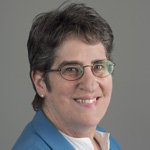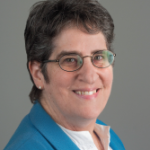
Dr. Hannan
ATLANTA—In the late 1990s, at the Annual Meeting, a colleague asked Marian Hannan, DSc, MSc, who is now professor of medicine at Harvard Medical School, if she wanted to go to a tourist attraction and talk about professional pursuits during a break at the conference. The colleague ranked higher than she did, and she didn’t know the person very well. But she accepted and had a great conversation about her career.
Now, she realizes the outing was typical of the ARP’s atmosphere of support and collegiality in career development, an attitude she both exemplified and encouraged in her ARP keynote talk at the 2019 ACR/ARP Annual Meeting. She thinks back fondly to that moment on how “good people in casual conversations had commitment to my career and what I should be doing and what my next steps forward should be. It was incredibly helpful.”
In her talk, Dr. Hannan emphasized how important it is to take advantage of the ARP’s opportunities and supportive environment, to have the right mindset for development in your career and as a person. She told the audience to keep “paying it forward” when you get career support by using what you’ve learned to help others with their goals.
She spoke at length about the nuances of collaboration. When working on any project with colleagues, there is a group dynamic that is critical to a project’s success, she said.
“If only one person owns a project, it’s not a collaboration—it’s hierarchical and, sometimes, you don’t get very good results that way,” Dr. Hannan said. Earlier in her career, she said, “I learned I couldn’t get buy-in for a project that’s already carved in stone.”
Collaboration, after all, is interacting with peers, and this is best accomplished without sharp lines of authority or rank. The members of the group should accept everyone as a “true peer,” she said.
“If a group can’t be persuaded by reason in a group dynamic, they should not be persuaded by authority,” Dr. Hannan said. “A collaborative effort is guided by consensus, not majority rule.”
An atmosphere of collaboration allows group members to speak up. It’s “not okay to think something and to be part of a collaborative group but to say nothing,” she said.
In meetings, members of groups should give reports on their individual efforts. “It’s really boring to go to a group and have one person lead and take up the entire talk,” she said.
Whether you notice it or not, Dr. Hannan said, you’re developing a style as a leader and colleague. This style is shaped by your willingness or unwillingness to learn from colleagues and to teach what you know; knowing your strengths, weaknesses and biases when you’re working with a group; and looking for the traits of a good collaboration and modeling yourself after those.
Collaboration … is interacting with peers, & this is best accomplished without sharp lines of authority or rank.
“All of us have been in horrible meetings, all of us have had horrible collaborations—from age 7 onward, we’ve been forced to do group projects, and there’s always this one person who’s a real pain in the neck in the group,” she said. “Yeah, we can complain about that. … Also, we need to look for markers of good collaborations—who are the people who are the good collaborators in the group? And I need to model myself on who those good collaborators are.”
Dr. Hannan said that something it took a while for her to appreciate is that life doesn’t move along in a nice, linear fashion. Therefore, if you wait for everything to fit neatly into place so the steps leading to career success fall like dominos, you may be frustrated. It’s okay, even necessary, to take “calculated leaps.”
“We often, on a daily basis, make intelligent choices from very thin data,” she said. “This implies we can’t wait for the domino effect for everything in our life. If you do that, your career takes a really long time.”
She encouraged the audience to distinguish between “résumé virtues”—such as getting a professorship at a young age—from the “eulogy virtues”—such as kindness and patience.
“The eulogy virtues are most meaningful to us.”
Thomas R. Collins is a freelance writer living in South Florida.



